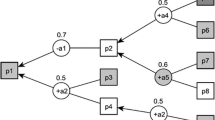Abstract
Defeasible reasoning is concerned with the logics of non-deductive argument. As is described in the literature, the study of this type of reasoning is considerably more involved than the study of deductive argument, even so that, in realistic applications, there is often a lack of resources to perform an exhaustive analysis. It follows that, in a theory of defeasible reasoning, the order and direction in which arguments are developed, i.e. theprocedure, is important. The aim of this article is to show that debate is the most efficient procedure to argue in the presence of limited resources. To do so, there is first some general theory on defeasible argumentation, which is followed by an introduction to the problem of dialectical search. The problem of dialectical search is (or at least, should be) the essential issue in every theory on argumentation, and emerges at every occasion that involves adjudication on competing arguments. Starting with an example, it is explained that dialectical search can be best scheduled according to classical debating techniques, that work along well-tried methods. These methods (which include various forms of curtailment, interruption, and interpretation) have proven their value in keeping debating efforts within reasonable bounds. How they apply in a theory of formal argument, will be shown in this article.
Similar content being viewed by others
References
Barth, E. M. and Krabbe, E. C. W.: 1978, ‘Formele Dialectiek: instrumenten ter beslechting van conflicten over geuite meningen’,Spektator 7, 277–301.
Barth, E. M. and Krabbe, E. C. W.: 1982,From Axiom to Dialogue: A Philosophical Study of Logics and Argumentation, Walter de Gruyter, Berlin, New York.
Bendegem, J. P. van: 1985, ‘Dialogue Logic and Problem-Solving’,Philosophica 35(1), 113–134.
Chisholm, R.: 1977,Theory of Knowledge, Prentice-Hall, New Jersey.
Copi, I. M. and Cohen, C.: 1953,Introduction to Logic, Macrnillan, New York.
Kneale, W. and Kneale, M.: 1962,The Development of Logic, Oxford University Press, Oxford.
Loui, R. P.: 1992, ‘Process and Policy: Resource-Bounded Non-Demonstrative Argument,’ Draft, Department of Computer Science, Washington University, St. Louis, October 1992.Computational Intelligence, in press
Pappas, G. S. and Swain, M.: 1978,Essays on Knowledge and Justification, Cornell University Press, London.
Pollock, J. L.: 1974,Knowledge and Justification, Princeton University Press.
Pollock, J. L.: 1986,Contemporary Theories of Knowledge, Rowman and Littlefield, Tolowa, NJ.
Pollock, J. L.: 1991, ‘A Theory of Defeasible Reasoning’,International Journal of Intelligent Systems 6, 33–54, John Wiley & Sons, Inc.
Prakken, H.: 1991, ‘A Tool in Modelling Disagreement in Law: Preferring the Most Specific Argument,’Proceedings of the Third International Conference on Artificial Intelligence and Law, St. Catherine's College, Oxford, England, ACM Press.
Simari, G. R.: 1989, ‘A Justification Finder,’ Report no. WUCS-89-24, Department of Computer Science, Washington University, St. Louis, Missouri, Washington, June 1989.
Sparkes, A. W.: 1991,Talking Philosophy: A Wordbook, Routledge, London.
Vreeswijk, G. A. W.: 1991, ‘Abstract Argumentation Systems: Preliminary Report’,Proceedings of the First World Conference on the Fundamentals of Artificial Intelligence, Paris, 501–510, Angkor. (A full version is published in a 1993 volume of Studia Logica.)
Vreeswijk, G. A. W.: 1993, ‘The Feasibility of Defeat in Defeasible Reasoning,’Proceedings of the 2nd International Conference on Knowledge Representation and Reasoning, pp. 526–534, Morgan Kaufmann Inc. (Also published inDiamonds and Defaults, Studies in Language, Logic, and Information, vol. 1, Kluwer, Dordrecht, pp. 359–380 1991.)
Vreeswijk, G. A. W.: 1992, ‘Reasoning with Defeasible Arguments: Examples and Applications,’Proceedings of the European Workshop on Logics in AI (JELIA), Berlin, pp 189–211, Springer Verlag, Berlin.
Vreeswijk, G. A. W.: 1993, ‘Studies in Defeasible Argumentation,’NVKI-Nieuwsbrief 2(10), pp 51–54, Nederlandse Vereniging voor Kunstmatige Intelligentie, Summary of the author's dissertation, which carries the same title, Vrije Universiteit Amsterdam, April 1993.
Vreeswijk, G. A. W.: 1993, ‘Defeasible Dialectics: A Controversy-Oriented Approach towards Defeasible Argumentation,’The Journal of Logic and Computation 3(3), 3–27.
Vreeswijk, G. A. W.: 1994, ‘IACAS User Manual v1.0,’ Technical Report CS 94-03, Vakgroep Informatica (FdAW), Rijksuniversiteit Limburg, Maastricht, The Netherlands.
Woods, J. and Walton, D.: 1982,Argument: The Logic of the Fallacies, McGraw-Hill Ryerson, Toronto.
Author information
Authors and Affiliations
Additional information
This research was made possible by SION, and is financed by NWO under contract number 612-316-019. Part of this research has been conducted at the Vrije Universiteit Amsterdam. This article contains fragments of Chapter 6 and Chapter 7 of the author's dissertation. ‘Studies in Defeasible Argumentation’ (1993).
Rights and permissions
About this article
Cite this article
Vreeswijk, G.A.W. The computational value of debate in defeasible reasoning. Argumentation 9, 305–342 (1995). https://doi.org/10.1007/BF00721964
Issue Date:
DOI: https://doi.org/10.1007/BF00721964




